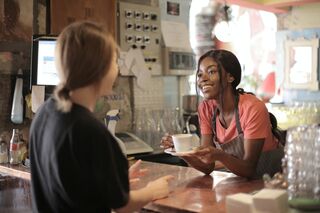Loneliness
The Pandemic Casualty of the Casual Crowd
It's the more subtle, smaller social losses that may be the hardest to regain.
Posted March 15, 2021 Reviewed by Davia Sills

In this global pandemic year, now having reached its anniversary, we as a society have coped with many losses and changes, some temporary, some gone forever, such as the staggering number of lives lost, and the livelihoods of several hard-hit industries cruelly targeted by the airborne spread of this coronavirus. While the amazing advent of safe and effective COVID-19 vaccines is giving us hope we didn’t have a year ago, a lot of uncertainty remains.
Beyond the obvious losses, it is worth taking a pause and reflecting on the smaller ones, too, the subtle things we took for granted in a pre-pandemic world that perhaps linger in a less blatantly traumatic way but are still quietly painful.
As many have noted, it’s the forced social isolation that has taken a large toll on many, as well as the downstream psychological impact of that shift. Innovation and technology have helped take some of the sting out of it: Zoom and FaceTime, streaming entertainment and education, both live and premade, quarantined social pods, distanced outdoor gatherings, etc. But for others, staying indefinitely at home became a form of virtual imprisonment, of house arrest, and of heightened domestic conflict, particularly for those trying to juggle childcare and jobs which barely functioned even before the pandemic.
More interestingly, some articles (such as one by Gillian Sandstrom and Ashley Whillans in the April 22, 2020 issue of the Harvard Business Review) have noted the more subtle social losses of a carefully quarantined world. There is no longer room for the small, spontaneous interactions (or what the authors term as "the surprising power of weak ties") that we had at work and at play while going about our errands or with people who were casually friendly acquaintances. We have joked in the past about the neighborhood grandma or grandpa who likes to chitchat too long in line when buying milk at the grocery store, but now perhaps we better understand their lonely plight.
We no longer had the silly watercooler conversations at work about everything from the latest football game to the big Oprah interview. We hardly had the social niceties of talking about the weather with a Starbucks barista. Everything was masked, with minimal contact and an undercurrent of fear.
City life, in particular, has been hurt by the pandemic. Bustling Manhattan became a semi-abandoned ghost town at the height of the first wave a year ago, with the privileged fleeing to their second homes in more isolated locales. Having lived there in my 20s, the beauty of NYC and other crowded cities like it is that artful sense of possibility created by so many human beings in close proximity, an electricity of manmade life unmatched by other settings. Slurping up noodles while perched on narrow counter stools in a shoebox-sized stall, randomly discussing an Avengers movie while buzzed at a hipster speakeasy, splurging on front row tickets to a David Byrne Broadway show, shopping for K-beauty products in K-town—all of it could be done to your own carefree pulse, at a moment’s notice.
While many have mentioned how social distancing has been particularly difficult for extroverts who thrive off spontaneous and frequent social interactions, even introverts have been deprived of the theatre of life that cities and similar crowded, close-knit venues provide. Sometimes it’s the simple routine of the pizza guy who recognizes you every time you get your lunchtime slice or the cab driver who converses with robust common sense about current events. You could still feel the illusion of company, at least while sitting on your laptop at cafes or people-watching in a museum after scoring an online ticket or browsing summer outfits at Uniqlo. It’s the loss of the casual crowd, both with occasional conflicts and niceties, that permeates the pandemic social shift the most.
And despite all our technology, it is still a difficult thing to recreate or adapt to safely with our current situation. No one seems to have figured out a practical and safe way to routinely disinfect the air in small spaces, other than possible HEPA air filtration, which itself isn’t foolproof and can be expensive. Masking helps, but not as much in restaurants or bars where they need to be removed (and of course, they erase the social cues of our facial expressions).
Aside from the public health logistics, the internet doesn’t always allow for the same sort of pleasant, casual social interactions that dot our daily lives. There are some attempts, like the latest trendy audio chat room Clubhouse or Zoom happy hours and wine tastings with strangers, but all still feel very circumscribed, artificial, and obligatory in their own way.
It’s the unstructured murmur of everyday human life that we have lost and are still mourning. We are creatures of necessity and have adapted via meditative pursuits like gardening, baking, Peloton, online chess, nature walks, and more. But like a Black Mirror episode, it still feels like we are in cubicles of virtual existence, no longer feeling the jagged, unsyncopated rhythm of urban social chaos, of extemporaneous vital movement in a 3-D populated world. Everyone has transmuted instead into anxious avatars.
Hopefully, despite the as-yet unclear threat of variants looming, the vaccination campaigns will restore at least some partial and much-needed variety to our narrowed lives again. Risk balances may shift for certain activities again, like carefully planned, masked travel or museum trips or shopping. But there will still be the cautious mental calculus behind even those activities, the constant weighing of benefits versus risks that has become our new raison d’etre. In the meantime, we can consider what we have lost and use it as motivation to do what we can to safely return to the world we took for granted. It takes a village, the one we miss so dearly.


